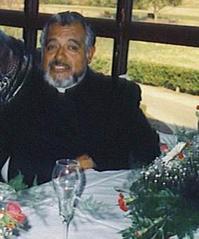Eleuterio Ramos Makes the Op/ed Pages of the New York Times
By Gustavo Arellano
n 2003, Daniel A. Olivas released Assumption and Other Stories, a well-received collection of pieces based on his life growing up and living in Southern California. The titular tale details a Latino priest, popular with his working-class barrio parish, who ends up molesting boys. Today, in a dramatic op/ed piece for the New York Times, Olivas reveals who the inspiration for the pedo-priest was: none other than Eleuterio Ramos, the most prolific pedophile priest in the history of the Diocese of Orange, and Olivas' childhood priest in "My parish knew him as Father Al, the hip young priest who spoke out for immigrant and Chicano rights, railed against the Vietnam War, could drink with the best of them and dedicated his spare time to mentoring the most troubled boys at St. Thomas," Olivas writes. While a wonderfully crafted piece, there are some oversights and errors that passed by the Times fact checkers, errors reported as facts by multiple publications in the past couple of weeks, publications that haven't followed the story for a decade, unlike the Weekly. Ramos was only transferred between 10 parishes, not 15. And Ramos was still a priest when the Orange diocese dragged him up from Tijuana to face two civil lawsuits in the early 1990s and never had his priestly faculties suspended. And casting former Archdiocese of Los Angeles Cardinal Roger Mahony as Ramos' superior, while technically true, also shifts the blame from the three men--Diocese of Boise Bishop Michael Driscoll, Diocese of Sacramento Bishop Jaime Soto, and current St. Timothy Church in Laguna Niguel pastor John Urell--most responsible for protecting Ramos. These points might seem like nitpicking, but they're crucial in remembering how far-reaching and monstrous Ramos' protectors were, a point Olivas beautifully concludes with. "I once hoped that fictionalizing Father Al would help expose the truth to a community that had been so thoroughly betrayed," he writes. "But I have now come to the conclusion that fiction can never match the audacious brutality visited upon those children for so many years."
Congrats, Orange diocese: you made the New York Times! Heckuva job, Brownie!
|
.
Any original material on these pages is copyright © BishopAccountability.org 2004. Reproduce freely with attribution.
